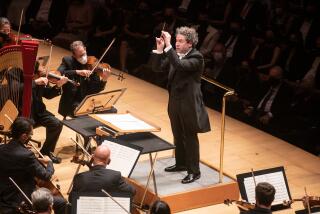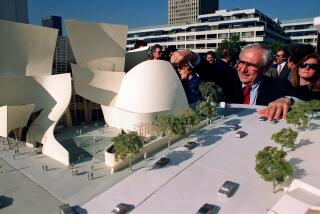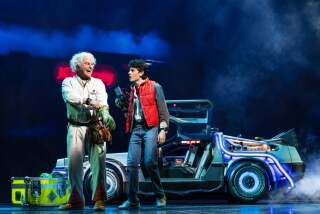Disney music to be performed at Disney Hall
Disney music at Disney Hall? Some might say: What took so long?
On Tuesday night, Walt Disney Concert Hall will host “The Disney Symphonic Legacy,” the first time a program of all-Disney music has been offered since the venue opened in 2003. And it will mark the Disney Hall debut of longtime Hollywood Bowl Orchestra conductor John Mauceri.
The concert will draw from more than 70 years of orchestral music written for Disney-produced movies, from “ Snow White and the Seven Dwarfs” (1937) to the more recent “Pirates of the Caribbean” trilogy (2003, 2006, 2007). Mauceri will conduct the Hollywood Bowl Orchestra and the Cal State Fullerton University Singers.
But it’s not the usual medley of big song hits, says Mauceri by phone from his North Carolina home, where he now serves as chancellor of the University of North Carolina School of the Arts and where he was poring over copies of the original “Snow White” orchestrations, trying to condense 73 minutes of music into about 45 for the program.
“Music was as important to Walt Disney as the visual,” says Mauceri, who conducted Disney-themed programs at the Bowl in 2004, 2005 and 2006. Those concerts “got the people at Disney thinking about the validity of the actual music scores, which are rarely performed without the use of films or characters. Can the music itself be the subject of a concert?”
Mauceri conferred with Thomas Schumacher, president of the Disney Theatrical Group, which oversees not just the stage versions of Disney films such as “The Lion King” and “Beauty and the Beast” but also all live presentations of Disney-owned material outside of the theme parks.
“I think there is enormous affection for this music,” Schumacher says. “As a concert, it’s totally valid. The question is, should this be part of a franchise?” To that end, Tuesday’s concert is an experiment to see if the concept -- an entire evening of the orchestral music of Disney films, old and new -- can become a series, with future editions spotlighting “Pinocchio,” “Bambi” or other famous titles.
As for the venue, a hall that the Disney family gave tens of millions of dollars to build, Schumacher deems it “irrelevant” but Mauceri says “the irony should not be missed.”
The larger point, says Mauceri, is that listeners “will be really surprised at the continuing quality of this music, and come away having a new respect for the genius of these composers -- and Walt Disney himself, in valuing the highest quality of music in telling his stories.”
Program elements
The event transposes Disney movie music into a fairly typical symphony-orchestra program:
* A light overture to kick things off, in this case a new concert version of music from Danny Elfman’s “The Nightmare Before Christmas” score;
* Another short piece, a suite from Tchaikovsky’s “Sleeping Beauty,” as adapted by George Bruns for Disney’s 1959 film;
* A more substantial work: a new, 15- to 20-minute “symphonic portrait” drawn from all three of Hans Zimmer’s “Pirates of the Caribbean” scores;
* And a rousing finale for the first half: a suite from “The Lion King,” featuring music mostly by Elton John and Zimmer.
In the case of the “Nightmare Before Christmas” overture and the new “Pirates” piece, both have been adapted by Mauceri from the original scores (with the blessings of the composers, Mauceri says).
The second half will, for many, be the reason to attend: What Mauceri calls “a symphonic retelling” of “Snow White and the Seven Dwarfs.” Following the model of his semi-staged reading of “Sunset Boulevard” at the Bowl in 2006 -- where Franz Waxman’s original film score served as the backdrop for actors reading the 1950 film script -- Mauceri has adapted the original “Snow White” script and score for 10 singer-actors, orchestra and choir.
What’s intriguing about the program is that it’s being done without film. (Mickey and Goofy won’t even be in costume greeting patrons at the door, apparently.) Explains Mauceri: “The other restorations that I’ve done are meant to show how the great film scores are viable as concert works. They work just the way the great ballet scores work in concert, or the great opera overtures work, as tone poems. The decision was not to put up a screen and have the orchestra huddled under it [but rather] to bring the music forward, so it can be heard.”
Adds Schumacher: “When you hear ‘Snow White,’ for the first time in your life you’re going to hear what Walt Disney heard when they recorded the music. The film doesn’t have the fidelity that you can get today.” Notes Mauceri: “You can barely hear some of this on the soundtrack, but there’s a delicate moment scored for harp, celesta and solo women’s voices. I can’t wait to hear that.”
Disney cartoons, both short subjects and feature-length vehicles, were treated to orchestral music as far back as the “Silly Symphonies” of the early 1930s, according to Ventura composer and film-music scholar Ross Care, who has studied and written about early Disney music. “Walt seemed to have an ear for it,” Care says. “It was obviously very important to him, because from the very beginning they were getting great musical scores.”
The difference at Disney, compared with other studios, was that a “collective composing” mentality existed whereby multiple composers worked on a single film, Care says. The songs for “Snow White and the Seven Dwarfs,” for example, were written by composer Frank Churchill and lyricist Larry Morey, while the underscore -- involving the adaptation of the song melodies and the creation of new subsidiary themes -- was done by Leigh Harline and to a lesser extent Paul J. Smith, names largely unknown today.
Still, notes Care, “the music holds up. The film is basically like an operetta, so that will easily translate to a live performance.”
More to Read
The biggest entertainment stories
Get our big stories about Hollywood, film, television, music, arts, culture and more right in your inbox as soon as they publish.
You may occasionally receive promotional content from the Los Angeles Times.






